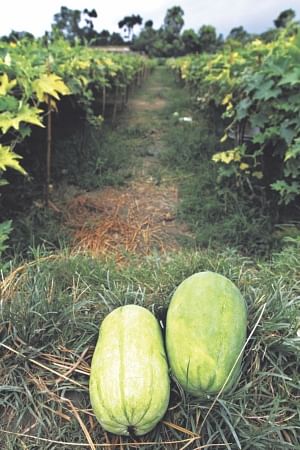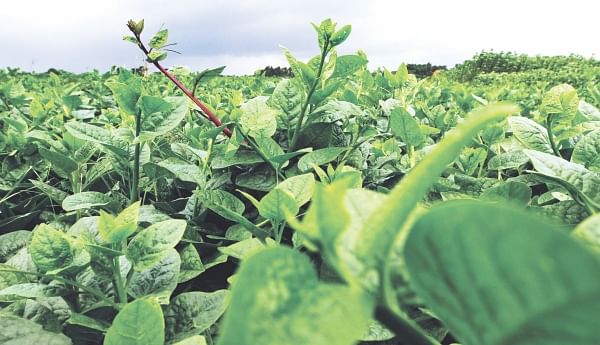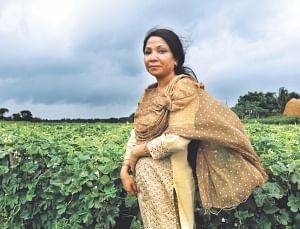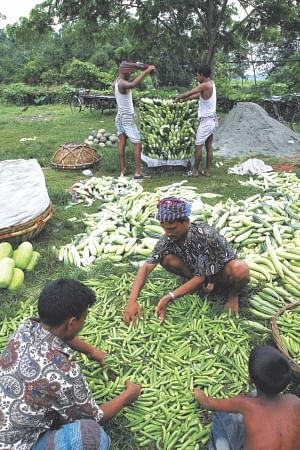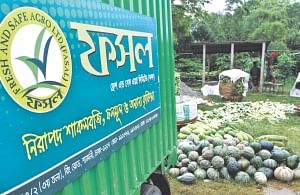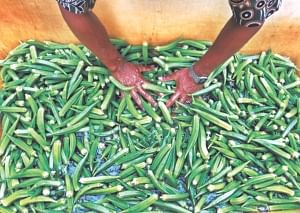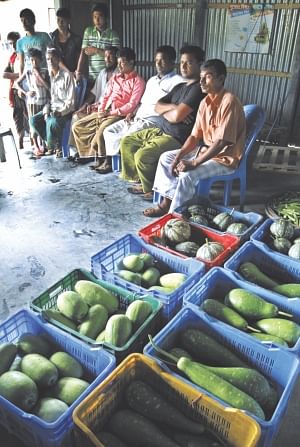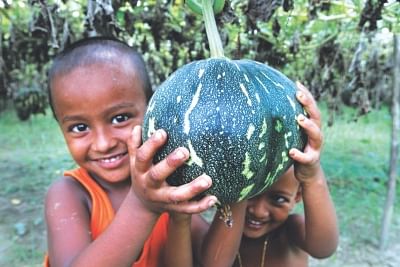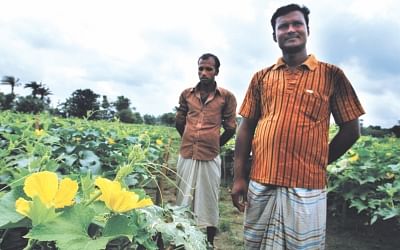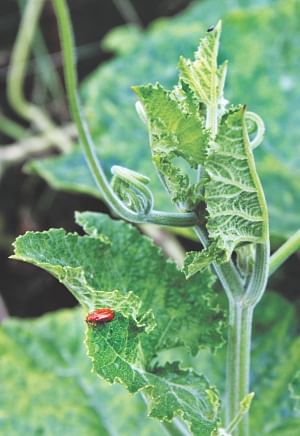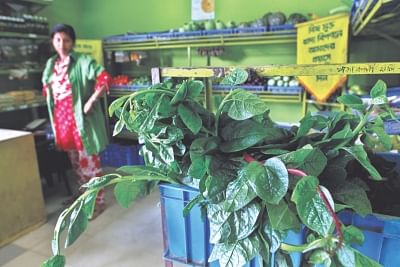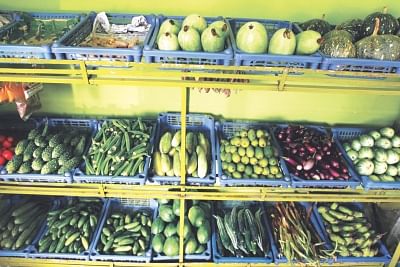| Home - Back Issues - The Team - Contact Us |
 |
| Volume 11 |Issue 26| June 29, 2012 | |
|
|
Cover Story COUNTERING THE GREEN REVOLUTION
In a country that is primarily agriculture based, the people of Bangladesh have great faith in their greens and rely on them as a primary source of nutrition. Most of us consume vegetables and fruits three times (or more) daily, confident of gaining all the necessary vitamins and minerals, such as iron, potassium, fibre, folate, calcium etc that we need to lead a healthy life. But latest reports of newspapers and investigations by law enforcers have revealed that the colourful, juicy well preserved fruits and veggies we find in markets, are not what they once were. They now come with added ingredients that make them look good but once we consume them, become poison for us. Innovators in the field of agriculture are now trying to find effective ways to deal with this issue. Anika Hossain Many decades ago, the farmers of Bangladesh all practised simple, organic methods to grow their crops. As the demand for produce grew, however, the need arose to grow more food, in a shorter span of time. In 1951, as a part of the Green Revolution, the Bangladeshi government permitted the import of chemical pesticides, to assist farmers to meet this growing demand and protect their crops from being destroyed by various insects and pests that infested their fields and fed on their harvest. What the government did not know, was that these pesticides, when used by illiterate farmers in large unauthorised doses can be dangerous not only to the pests, but also to the environment and the lives of humans and animals that come into contact with them. The chemicals that are less bio degradable can remain in the ecosystem for a long time and eventually become a part of the food chain. Research shows that in the late 90's, about 39 insecticides, 21 fungicides, 10 herbicides, 7 acricides and 2 rodenticides were being used in Bangladesh in agriculture and the public health sector (Rahman & Alam 1997, working for the Department of Civil Engineering in BUET and The Department of Environmental Engineering and Pollution Control at the Shahjalal Science and Technology University). This amount has increased over the years, especially since the government discontinued subsidies for chemical pesticides and the business was handed over to the private sector. 1981 was the peak year for agrochemical coverage in this country, during which about 2 million acres of paddy received some form of chemical protection. By 1988, this increased to slightly more than one and half times that amount (according to research by Mahbub Robbani, Salah Uddin Siddiquee, Souravi Zaman Hiroshi Nakamura, faculty members of the Agriculture Department at Shinshu University in Japan, conducted in the year 2007).
The use of these chemical pesticides is not effectively controlled in this country and some toxic and persistent pesticides such as DDT, endrin, BHC, aldrin, dieldrin, heptachlore and thiodin which have been banned in agricultural use, are being illegally imported and used for pest management. Huge amounts of organophosph-ates are also being used by farmers to protect winter crops. Residue of these pesticides was found inside fish and birds which we consume. Some pesticides played a role in sterilising entire fields and causing high mortality rates in the animals residing near the chemically treated farms. If these chemical pesticides are causing so much disruption in the environment and reducing the life span of so many different species of animals, just imagine what they are doing to humans. These complicated scientific sounding names of poisons may seem alien to most of us, but their effects can hardly go uncomprehended or unnoticed. As research reveals, over a long period of time, chemical pesticides have slowly entered our blood stream, causing chronic conditions such as asthma, various birth defects in children such as limb reduction and cleft palate among others. These chemicals can also cause neurological problems such as reduced IQ, and learning disabilities which are associated with permanent brain damage. They have played a role in increasing the rates of childhood cancers such as leukemia, brain cancer and ovarian cancer in teenagers. Some chemicals can cause more subtle damage such as hormonal disruption, which give rise to fertility problems, low sperm count, precocious puberty in girls and undescended testicles which may later become a cause for cancer.
It all sounds quite ominous doesn't it? Despite the efforts of the government to introduce a more sustainable form of agriculture through the development of the Integrated Pest Management, a project which aims to train farmers to use alternative techniques to trap and eliminate crop damaging pests in an eco friendly manner, they were unable to reduce the use of chemicals in farms all over the country. One innovative woman however, has come up with an idea, which when she put to test turned out to be both effective as well as sustainable. Sharmin Hossain, the chairman of Fresh and Safe Agro Ltd (FASAL), who received the Outstanding Woman in Business award at the Business Awards Ceremony organised by The Daily Star and DHL Express in 2012, did not always know she wanted to be an entrepreneur. “I didn't start farming as a business venture at first,” says Hossain “We (my family) have some land in Manikganj and since I studied agriculture, I decided to take charge of this and grow a variety of seasonal vegetables there. At the time, I hadn't heard of pesticide and chemically maturing fruit for consumption so everything I did was organic. Then the neighbours soon started to follow my example and friends and family members encouraged me to start a small business based on pesticide free farming.”
In 2010, Hossain along with a group of professionals, mentored by a qualified and experienced technical and business development team established FASAL, which is committed to producing and providing safe, hygienic and fresh vegetables and fruits by using eco-friendly bio agents and following global standards set by the Integrated Pest Management (IPM) and Good Agricultural Practices (GAP). The technical team at FASAL headed by director Mokhlesur Rahman, has extensively researched and experimented with many formulas before coming up with two perfect blends, one using cucumber leaves and another, with neem seeds that work as effective bio pesticides. Members of FASAL identify different agriculture zones they wish to target and contact the krishi officer (agriculture officer) of these areas and ask for their help to organise meetings with local farmers in order to speak to them about the advantages of using these bio pesticides over chemicals. “We find out what kind of vegetables each farmer produces, and group them together according to their crops,” says Hossain, “We select say ten farmers growing the same products and create a common interest group, my field officers, who all hold diplomas in agriculture have a record of these farmers and train them to take care of the products they grow. They also visit these fields regularly and monitor the farmers' progress. They find out their problems and concerns and report them to the head office where we try to solve them. Sometimes, we will hire experts from outside the company to train the farmers as well.” When these chemical free crops are harvested, FASAL buys up a portion of each farmer's produce at a fixed price and markets them in a number of different outlets. “We have local collection centres in each area where we bring in the crops we buy from these farmers and they are washed and sent to the central collection centre in Gabtoli which we call the central distribution point. Here, we do the washing, grading and sorting and distribute them to our various outlets.”
Hossain observed that there is a growing number of cancer patients and patients with liver disease and kidney problems in this country, “Where do you think all this is generated from?” she asks, “The food we consume of course. Farmers using pesticides often do not even know the right amount that should be used and use an overdose on their crops. They don't wait for the residual effects of this pesticide to wear off before harvesting again. They need to be educated, about timelines and the effects of harvesting before its time,” she explains. Initially, the farmers were reluctant to use FASAL's bio pesticides, but as they observed the few that did use them, they began to realise that there are benefits to this. “Pesticides are expensive and our product is available to them for free and is just as effective,” shares Hossain, “Mr Mokhlesur Rahman's formula with cucumber leaves is very successful. These leaves are available in abundance to the farmers and they can make this concoction themselves if they wanted to, for free. The one we make with neem however is a bit more complicated to produce but we are providing it for free so they don't have to worry about that. We don't market these commercially yet; we are just trying to get the farmers used to them. These bio pesticides have no side effects, if they are sprayed today, the farmers can easily start their harvest tomorrow.” Field officers at FASAL find out which areas have good crop harvest and make a trip there to convince the farmers to adopt their methods. “The government also has many projects such as the NAPD project run by IPM, they have some techniques involving ferment rays and light traps for integrated pest management but once the project has run its course it's all over,” says Hossain. “They have no arrangements for marketing, which is why farmers lose interest. We find their pilot locations and set up in these areas to continue pesticide free farming.” With all this effort one must wonder why Hossain and her team have not ventured into organic farming. “We haven't gone into organic because if the fields next to ours don't practice the same methods, my crops will be contaminated by their pesticides,” explains Hossain. Organic methods would involve using natural seeds as opposed to the hybrids created in laboratories, which are being used by farmers in this country. It would also involve crop rotation which means a variety of crops would be planted in the same field to get natural nutriets from eachother and prevent the build up of pathogens and pests that occur when one species of crop is continuously harvested. It can also improve the soil structure and fertility. Organic methods would also involve planting green manure, or plants that are grown primarily to add nutrients to the soil. Compost or organic matter that is decomposed and recycled as soil fertiliser is also used in organic farming. “Even if I manage to convince those around me to use organic methods it will still take me at least 5 to 8 years to get started, mainly because of the expenses involved. We are somewhere in the middle now between organic and inorganic and I believe that slowly we can move towards organic methods it's just a matter of raising awareness and getting support from the government.” Hossain comments that nowadays people are quite aware of what's happening to their food. They read and watch news about formaline used to preserve fruits and vegetables and the effects of pesticides and are reluctant to buy many things that they would buy blindly before. “We have a hot water purifier plant which we brought from the Bangladesh Agriculture Research Institute which we use to treat fruits such as mangoes etc before distribution, this helps get rid of all chemicals before distribution so consumers can be rest assured it is safe,” assures Hossain.
Mokhlesur Rahman joined FASAL hoping to make a difference in some small way. “My research showed that the pesticides that are used in Bangladesh are extremely poisonous for people,” he says. “The tolerance level for this poison in human blood is 0.02 percent but blood tests during research have shown that the level of poison in the bloodstream of the average Bangladeshi is 9.7 percent. We are basically consuming poison three times a day every day, year after year. It's a continuous process and causes health problems like headaches, heart conditions, problems in the digestive system and cancer among other equally serious problems.” According to Rahman, the farmers will continue to use pesticides to save their crops and ensure proper harvest, “These pesticides have also been approved by the government and those who sell this poison are also licensed by the government,” he explains. “The government cannot prevent the sale of pesticides because the pests that destroy crops must be killed. However, everyday, these pests are becoming more and more resistant to these chemical pesticides and therefore, farmers are spraying larger amounts to kill them.” When asked why FASAL does not sell its bio pesticides Rahman says “If we were to sell these products we would need registration which is a long and complicated process. I make the neem seed pesticide in the office laboratory and the cucumber pesticide is made on the fields, supervised our field officers who hold diplomas in Agricultural Studies.” In the past, Bangladesh had a law for chemical pesticide production and use. Recently, the government has come up with a law for bio pesticides. Unfortunately, no one has registered sale of bio pesticides under the new law as of yet. “I have applied for registration but it is still a very long process because there is no equipment or resources to test these products and it will take time before the government can get all this organised.” In Chuadanga, a small village in Manikganj, a group of farmers are very happy with their harvest this season. They proudly display their lush vegetable patches, abundant in vibrant yellow flowers and delectable vegetables. They claim they owe their success to FASAL and its bio pesticides. Each vegetable zone overseen by FASAL has a leader elected by the farmers themselves, Mohammad Osman Gani, is the head farmer of Chuadanga. “There are about 35 farmers in my area using bio pesticides,” he informs us. “I grow Korolla, Lau, Jali Kumra, Mishti lau, shosha, dhundul, kakrol, papaya, etc. After using bio pesticides, I have seen a growth in harvest and a new strength in plant life and the pests/insects no longer attack my crops. My crops have given me their seasonal vegetables and are almost at the end of their life but they are still strong and healthy. I grow spinach and have a small successful fishery here as well,” he smiles with pride.
As he walks through Gani's farm, Osman explains the various advantages of the bio pesticides. “There are two types of insects in these fields, ones that are harmful to the plants and others that are good for the plants – the non vegetarian insects that eat the vegetarian ones that destroy the crops. By using chemical pesticides, we are killing both kinds of insects which can ultimately be more harmful. The vegetarian insects become more resistant to the pesticides as time goes on but the non vegetarian ones are weak and cannot survive this. Our bio pesticides only get rid of harmful vegetarian pests. Useful insects, such as the honey bee that helps with pollination are safe from these pesticides. Without pollination we would not have fruits, so because of the bio pesticides, the farmers have more flowers and more fruits and vegetables.” “My vegetables look healthier and have beautiful colouring since I started using bio pesticides,” says Gani as he holds them out for a closer examination. “Ever since I started selling my vegetables to FASAL, which requires the vegetables to be a certain size in order to buy them, all the other dealers at the market also ask for this particular size of vegetables. My nephew is also using these natural pesticides and he has benefitted from it as well. We have a lot more produce than when we used chemical pesticides. I have had so much produce this year that people cannot believe that my little field is so fertile. I myself am amazed at the difference it makes. When the other farmers see my crops and hear that my plants, even toward the end of the season are so healthy and still producing beautiful vegetables, they are curious to know my secret and when I tell them, they want to try it out for themselves.” Gani's nephew Musharraf has also recently started using these pesticides. “My crops are doing very well since I started using these bio pesticides, my produce is larger and healthier and today, while everyone else sold their pumpkins for Tk 14 per piece, I sold them for Tk 18 at the bazaar this morning. Dealers wait for my produce and argue over who should get more of it,” he smiles. Chemical pesticides not only affect the consumers, but direct contact with them over a period of time can also be harmful for the farmers. Mohammad Zubair, also a farmer at Chuadanga was a victim of the effects of these chemicals. “I must have sprayed excessive amounts of chemical pesticides because one day, I felt like I was going to throw up and then I suddenly fainted,” he recalls. “I was ill for about 15 days after that. I have started using bio pesticides since then. I wish FASAL would buy up some more of my products. They buy them at a higher rate than the market rate so I can make a profit.” Another farmer, Abdur Razzak says, “I always noticed that the chemical pesticides never really killed all the insects that harmed the plants but this bio pesticide has worked wonders.” Yet another farmer Abdul Jalil says, “My dharosh plants were really suffering when I was using chemical pesticides. All the leaves had blackened and I was operating at a loss. Then three years ago, FASAL introduced me to this bio pesticide and I have gotten immediate results and I myself have been healthier since I started using it and my family's health has improved as well.” With positive feedback all around, and a crowd of farmers waiting at the collection centres with their chemical free produce, FASAL is well on its way to success, but Sharmin Hossain hasn't stopped at that. This remarkable woman has also set up projects to assist female farmers in small ventures and encouraged them to use her bio pesticides.
“One project that we are currently working on deals with pesticide farming in homestead gardening and the beneficiaries in this project are all women,” informs Hossain. “There are about 3500 women involved in this project and it is set up in Pabna. Basically these women have a tiny strip of land next to their homes mostly and they get vegetable seeds/saplings from us and sow them into this plot and grow them using bio pesticides. Now, it has become like competition among these women about who will grow more and better crops. They are very happy and proud of themselves. We have arranged an aggregator to purchase their crops. The ten or twenty Takas, whatever they make from the crops is their own money. They can make upto 300 Takas and it gives them somewhat of a voice in their families.” FASAL is also conducting another project at Binada-ngai, a sort of trade model where 5 women entrepreneurs get a loan from a financial institution, and FASAL gives them technical support such as helping them build huts and purchase cows. “If the cows fall ill or they need advice as to what to feed the cows, we are there to give them advice and help them in various ways,” says Hossain. “Then, we market the milk the cows produce for them. We are working with 5 such dairy farmers of whom four are very successful and have already started to repay their loans.” FASAL is now based at more than fifteen locations including Manikganj, Chuadanga, Norshindi, Tangail and Dhaka district which is an established vegetable production zone and currently working with more than 12,000 trained farmers. Its retail operations are limited to selected locations within Dhaka city. It is also supplying fresh vegetables and fruits to institutional customers like retail chains, star hotels and fast food restaurants. It is also catering to large retailers like Agora and Nandan. FASAL products are also available at their own retail outlets established in selected markets, via rickshaw vans and other small retailers all over the city. This company is not only ensuring the health and safety of thousands of farmers and consumers, it is also ensuring peace of mind for those of us who are appalled by what we have learned about chemical pesticides. It needs all the assistance it can get from us. Sharmin Hossain has taken the first steps toward safe agriculture; let's hope she can expand FASAL and continue its good work and that others soon follow in her footsteps.
|
||||||||||||||||||||||||||||||||
Copyright
(R) thedailystar.net 2012 |
